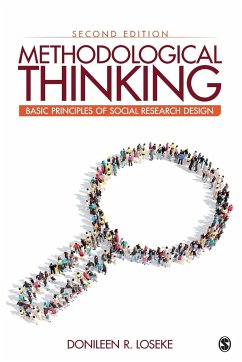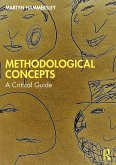- Broschiertes Buch
- Merkliste
- Auf die Merkliste
- Bewerten Bewerten
- Teilen
- Produkt teilen
- Produkterinnerung
- Produkterinnerung
With a new discussion on the philosophy of science and an expanded focus on research ethics and sampling, this second edition continues to give readers an interdisciplinary account of the logic of social science research
Andere Kunden interessierten sich auch für
![Qualitative Inquiry at a Crossroads Qualitative Inquiry at a Crossroads]() Qualitative Inquiry at a Crossroads66,99 €
Qualitative Inquiry at a Crossroads66,99 €![Methodological Concepts Methodological Concepts]() Martyn HammersleyMethodological Concepts31,99 €
Martyn HammersleyMethodological Concepts31,99 €![Advancing Qualitative Inquiry Toward Methodological Inclusion Advancing Qualitative Inquiry Toward Methodological Inclusion]() Advancing Qualitative Inquiry Toward Methodological Inclusion39,99 €
Advancing Qualitative Inquiry Toward Methodological Inclusion39,99 €![The Reviewer's Guide to Quantitative Methods in the Social Sciences The Reviewer's Guide to Quantitative Methods in the Social Sciences]() The Reviewer's Guide to Quantitative Methods in the Social Sciences58,99 €
The Reviewer's Guide to Quantitative Methods in the Social Sciences58,99 €![Practice Theory and Research Practice Theory and Research]() Practice Theory and Research38,99 €
Practice Theory and Research38,99 €![Engaging Children and Youth in Africa. Methodological and Phenomenological Issues Engaging Children and Youth in Africa. Methodological and Phenomenological Issues]() Engaging Children and Youth in Africa. Methodological and Phenomenological Issues43,99 €
Engaging Children and Youth in Africa. Methodological and Phenomenological Issues43,99 €![Methodological Individualism Methodological Individualism]() Nathalie Bulle (National Center for Scientific Research (CNRS) FraMethodological Individualism77,99 €
Nathalie Bulle (National Center for Scientific Research (CNRS) FraMethodological Individualism77,99 €-
-
-
With a new discussion on the philosophy of science and an expanded focus on research ethics and sampling, this second edition continues to give readers an interdisciplinary account of the logic of social science research
Hinweis: Dieser Artikel kann nur an eine deutsche Lieferadresse ausgeliefert werden.
Hinweis: Dieser Artikel kann nur an eine deutsche Lieferadresse ausgeliefert werden.
Produktdetails
- Produktdetails
- Verlag: SAGE Publications Inc
- 2 Revised edition
- Seitenzahl: 208
- Erscheinungstermin: 10. Februar 2016
- Englisch
- Abmessung: 229mm x 152mm x 11mm
- Gewicht: 318g
- ISBN-13: 9781506304717
- ISBN-10: 1506304710
- Artikelnr.: 43546328
- Herstellerkennzeichnung
- Produktsicherheitsverantwortliche/r
- Europaallee 1
- 36244 Bad Hersfeld
- gpsr@libri.de
- Verlag: SAGE Publications Inc
- 2 Revised edition
- Seitenzahl: 208
- Erscheinungstermin: 10. Februar 2016
- Englisch
- Abmessung: 229mm x 152mm x 11mm
- Gewicht: 318g
- ISBN-13: 9781506304717
- ISBN-10: 1506304710
- Artikelnr.: 43546328
- Herstellerkennzeichnung
- Produktsicherheitsverantwortliche/r
- Europaallee 1
- 36244 Bad Hersfeld
- gpsr@libri.de
Donileen R. Loseke is a Professor Emeritus in the department of sociology at the University of South Florida. She received her BA and MA in psychology (California State University, Dominguez Hills) and her PhD in sociology (University of California, Santa Barbara). Her books include Narrative Productions of Meanings: Exploring the Work of Stories in Social Life; Methodological Thinking: Basic Principles of Social Research Design, 2e; The Battered Woman and Shelters, which won the Charles Horton Cooley Award from the Society for the Study of Symbolic Interaction; and Thinking About Social Problems. She also is the editor of Current Controversies on Family Violence (with Richard Gelles) and Social Problems: Constructionist Readings (with Joel Best). Numerous journal articles and book chapters report the findings of her empirical research projects, which have been on a variety of topics including evaluation research, social problems, criminal justice, social service provision, occupations, emotion, identity, and narrative and have used a variety of data generation techniques including field experiment, written survey, in-depth interview, ethnography, and document analysis. Among her editorial positions include former editor of the Journal of Contemporary Ethnography, advisory editor for Social Problems and Deputy Editor for Social Psychology Quarterly. She received the Mead Lifetime Achievement Award from the Society for the Study of Symbolic Interaction and was the Past- President of the Study of Social Problems as well as Past-President of the Society for the Study of Symbolic Interaction.
1. Exploring the World of Social Research Design
Defining Social Research
The Study of Social Research Design
Evaluating Social Research
Methodological Thinking
Studying Research Design as Methodological Thinking
Methods in Theory and in Practice
2. Foundations
Foundation I: Data, Concepts, and Theory
Foundation II: The Logic of Relationships Between Data and Concepts/Theory
Foundation III: Philosophies of Science
The Qualitative Versus Quantitative Debate
Foundations and Research Design
3. Research Questions
Characteristics of Appropriate Research Questions
Identifying Research Questions in Published Research
Creating Research Questions
Thinking Ahead: Developing Questions That Will Be Ethical and Practical to
Study
Revising Research Questions
Evaluating Research Questions
Research Questions and Research Design
4. Literature Reviews
Defining "The Literature"
Existing Knowledge as Tools for Research Design
Defining the Relevant Literature
Thinking About the Review Task
The Contents and Form of Literature Reviews
Evaluating Literature Reviews
Literature Reviews and Research Design
Examples of Social Research Article Databases
5. Measurement
Conceptualization and Conceptual Definitions
Operationalization and Operational Definitions
Conceptualization and Operationalization in Research Led by Inductive
Reasoning
Measurement Problems in Social Research
Evaluating Measurement
Measurement and Research Design
6. Data Generation Techniques
Research Questions and Data
Data Generation Techniques
Planning Ahead
Data Generation Techniques and Research Design
7. Samples
Populations and Samples in Social Research
The Importance of Samples in Social Research
Probability Samples
Non-probability Samples
Evaluating Samples in Published Research
Samples and Research Design
8. Summary: Thinking About Social Research Design
Foundations of Research Design and Evaluation: Methodological Thinking
Evaluating Research Design: Variations
Assessing Research Quality
Characteristics of High-Quality Reports of Research Design
Ending and Beginnings
Appendix: Suggestions for Further Reading
Appendix: Articles Used as Examples
Defining Social Research
The Study of Social Research Design
Evaluating Social Research
Methodological Thinking
Studying Research Design as Methodological Thinking
Methods in Theory and in Practice
2. Foundations
Foundation I: Data, Concepts, and Theory
Foundation II: The Logic of Relationships Between Data and Concepts/Theory
Foundation III: Philosophies of Science
The Qualitative Versus Quantitative Debate
Foundations and Research Design
3. Research Questions
Characteristics of Appropriate Research Questions
Identifying Research Questions in Published Research
Creating Research Questions
Thinking Ahead: Developing Questions That Will Be Ethical and Practical to
Study
Revising Research Questions
Evaluating Research Questions
Research Questions and Research Design
4. Literature Reviews
Defining "The Literature"
Existing Knowledge as Tools for Research Design
Defining the Relevant Literature
Thinking About the Review Task
The Contents and Form of Literature Reviews
Evaluating Literature Reviews
Literature Reviews and Research Design
Examples of Social Research Article Databases
5. Measurement
Conceptualization and Conceptual Definitions
Operationalization and Operational Definitions
Conceptualization and Operationalization in Research Led by Inductive
Reasoning
Measurement Problems in Social Research
Evaluating Measurement
Measurement and Research Design
6. Data Generation Techniques
Research Questions and Data
Data Generation Techniques
Planning Ahead
Data Generation Techniques and Research Design
7. Samples
Populations and Samples in Social Research
The Importance of Samples in Social Research
Probability Samples
Non-probability Samples
Evaluating Samples in Published Research
Samples and Research Design
8. Summary: Thinking About Social Research Design
Foundations of Research Design and Evaluation: Methodological Thinking
Evaluating Research Design: Variations
Assessing Research Quality
Characteristics of High-Quality Reports of Research Design
Ending and Beginnings
Appendix: Suggestions for Further Reading
Appendix: Articles Used as Examples
1. Exploring the World of Social Research Design
Defining Social Research
The Study of Social Research Design
Evaluating Social Research
Methodological Thinking
Studying Research Design as Methodological Thinking
Methods in Theory and in Practice
2. Foundations
Foundation I: Data, Concepts, and Theory
Foundation II: The Logic of Relationships Between Data and Concepts/Theory
Foundation III: Philosophies of Science
The Qualitative Versus Quantitative Debate
Foundations and Research Design
3. Research Questions
Characteristics of Appropriate Research Questions
Identifying Research Questions in Published Research
Creating Research Questions
Thinking Ahead: Developing Questions That Will Be Ethical and Practical to
Study
Revising Research Questions
Evaluating Research Questions
Research Questions and Research Design
4. Literature Reviews
Defining "The Literature"
Existing Knowledge as Tools for Research Design
Defining the Relevant Literature
Thinking About the Review Task
The Contents and Form of Literature Reviews
Evaluating Literature Reviews
Literature Reviews and Research Design
Examples of Social Research Article Databases
5. Measurement
Conceptualization and Conceptual Definitions
Operationalization and Operational Definitions
Conceptualization and Operationalization in Research Led by Inductive
Reasoning
Measurement Problems in Social Research
Evaluating Measurement
Measurement and Research Design
6. Data Generation Techniques
Research Questions and Data
Data Generation Techniques
Planning Ahead
Data Generation Techniques and Research Design
7. Samples
Populations and Samples in Social Research
The Importance of Samples in Social Research
Probability Samples
Non-probability Samples
Evaluating Samples in Published Research
Samples and Research Design
8. Summary: Thinking About Social Research Design
Foundations of Research Design and Evaluation: Methodological Thinking
Evaluating Research Design: Variations
Assessing Research Quality
Characteristics of High-Quality Reports of Research Design
Ending and Beginnings
Appendix: Suggestions for Further Reading
Appendix: Articles Used as Examples
Defining Social Research
The Study of Social Research Design
Evaluating Social Research
Methodological Thinking
Studying Research Design as Methodological Thinking
Methods in Theory and in Practice
2. Foundations
Foundation I: Data, Concepts, and Theory
Foundation II: The Logic of Relationships Between Data and Concepts/Theory
Foundation III: Philosophies of Science
The Qualitative Versus Quantitative Debate
Foundations and Research Design
3. Research Questions
Characteristics of Appropriate Research Questions
Identifying Research Questions in Published Research
Creating Research Questions
Thinking Ahead: Developing Questions That Will Be Ethical and Practical to
Study
Revising Research Questions
Evaluating Research Questions
Research Questions and Research Design
4. Literature Reviews
Defining "The Literature"
Existing Knowledge as Tools for Research Design
Defining the Relevant Literature
Thinking About the Review Task
The Contents and Form of Literature Reviews
Evaluating Literature Reviews
Literature Reviews and Research Design
Examples of Social Research Article Databases
5. Measurement
Conceptualization and Conceptual Definitions
Operationalization and Operational Definitions
Conceptualization and Operationalization in Research Led by Inductive
Reasoning
Measurement Problems in Social Research
Evaluating Measurement
Measurement and Research Design
6. Data Generation Techniques
Research Questions and Data
Data Generation Techniques
Planning Ahead
Data Generation Techniques and Research Design
7. Samples
Populations and Samples in Social Research
The Importance of Samples in Social Research
Probability Samples
Non-probability Samples
Evaluating Samples in Published Research
Samples and Research Design
8. Summary: Thinking About Social Research Design
Foundations of Research Design and Evaluation: Methodological Thinking
Evaluating Research Design: Variations
Assessing Research Quality
Characteristics of High-Quality Reports of Research Design
Ending and Beginnings
Appendix: Suggestions for Further Reading
Appendix: Articles Used as Examples








